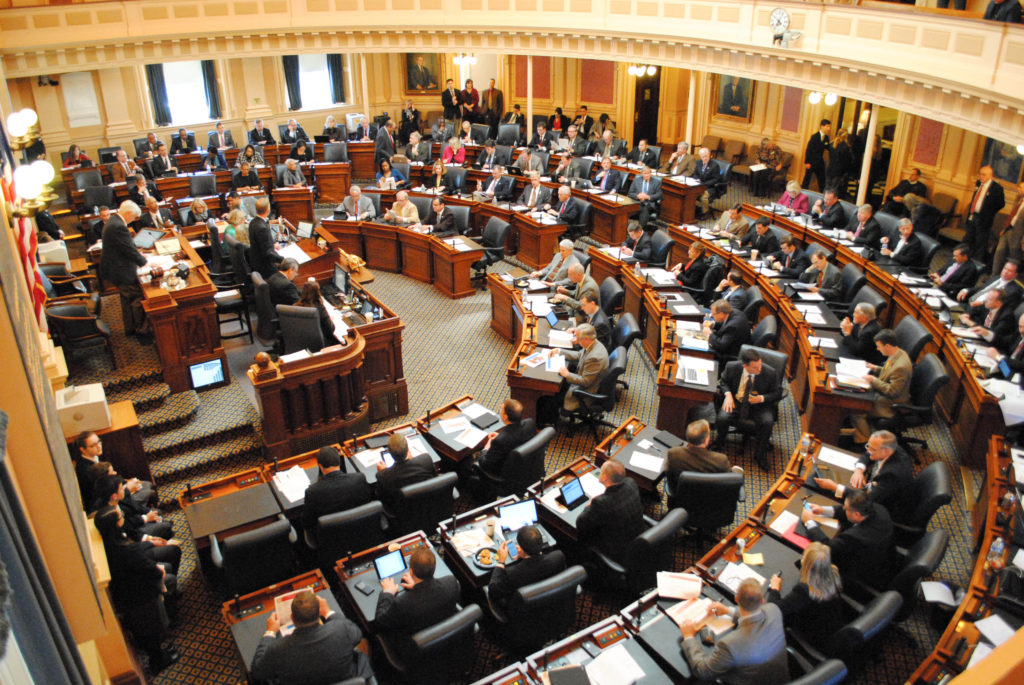Yesterday morning, Speaker of the Virginia House of Delegates Kirk Cox (R-Colonial Heights) petitioned the Eastern District Court to stay the judicially-mandated remedial redistricting process and move the primary election deadlines for the 2019 House races, with all 100 legislators in the lower chamber up for re-election. Pending the Supreme Court case in this matter, Speaker Cox asked the court to move the date of the 2019 primary elections for the House of Delegates to Tuesday, September 10, adjusting other deadlines accordingly. The current date for the primary elections statewide for both houses of the General Assembly is set for June 11, 2019, with the new request only to affect House elections.
“The United States Supreme Court will hear our appeal early in 2019 and it makes sense to pause the process of developing a remedial map while that case is taken up,” said Speaker Cox.
The 416-page appeal from the Republican speaker of the Virginia legislature prods the U.S. Supreme Court to consider “paradigmatic” errors made by the district court in their decision to declare 11 House districts unconstitutionally racially gerrymandered. Cox argued that the previous court ruling committed a “clear legal error,” with him explaining that race was not the predominant factor in the drawing of the 11 challenged districts in the Richmond and Hampton Roads metropolitan areas.
The GOP weeks ago went forth in drawing a new legislative map to satisfy new requirements from the court after Democrats kept their map drawing process in secrecy from the Privileges and Elections Committee during its unveil to the General Assembly at a committee hearing. To dodge having a court-appointed specialist re-draw Virginia’s legislative map, Republicans in the House released a “politically neutral, race-blind” remedial redistricting map, which garnered bipartisan support. Some of the apolitical characteristics of the newly-drawn map were that it did not make any unnecessary changes to the legislative boundaries, like altering non-adjacent districts; it did not combine any currently-elected House members in new districts; and it did not significantly alter the partisan makeup of any competitive House district.
Nevertheless, Governor Ralph Northam (D) declared that he would veto House Bill 7003 despite the fact that it was supported by some members of his own party, causing the speaker to cancel the special session in Richmond to vote on the redistricting plan. Afterwards, the fate of the map went to the court, with Cox motioning for the Supreme Court to get involved.
Two weeks ago, the Supreme Court agreed to hear the appeal by the leader of the Virginia House of Delegates after the ongoing litigation over the 11 challenged legislative districts. Virginia House of Delegates v. Bethune Hill (2019) is set for briefing and oral arguments in the Spring, following weeks of impasses, mysterious cartographers, “self-serving” partisan power grabs, and a thinly-divided state legislature to be heard by the newly-cemented conservative high court.
Speaker Cox adds in his 33-page request to the Eastern District Court as the case is now in the hands of the high court, “The publication of a remedial map would create significant confusion and require state and local election officials to begin an inordinate amount of work preparing to use a map that may not even be necessary if the Supreme Court rules in our favor. We are asking the Court to stay the development of the remedial map until the Supreme Court can make a final decision in this case.”
In a press release, Cox said, “Regardless of the lower court’s decision on the stay, there is a great deal of uncertainty around what the map will look like. With filing deadlines, nomination contests, and other election activities already approaching, the possibility of two maps could create unnecessary chaos for candidates, election officials, and voters. Of the thousand possible outcomes of the Supreme Court’s decision, only one completely affirms the lower court’s decision.”
The speaker alludes to the possibility that a decision by the Supreme Court, if the dates are not moved, could “invalidate” elections in Virginia House races if the decision by the lower court is eventually overturned. The costs involved with voting infrastructure and the personnel to alter official electoral documents would be incurred by state taxpayers, all of which, according to Cox, could be mitigated.
“You could easily foresee a scenario where a nomination contest is completely invalidated by the Supreme Court’s decision, or a scenario where a candidate declares in one district only to find out later that they have been moved into another district. Election and party officials could be forced to spend hours of manpower and significant resources to redo paperwork and official election actions. Tens of thousands of voters will not know where they should register or vote, or even which candidates they will have to choose from,” said Cox.
The Colonial Heights legislator proposed three changes to next year’s primary election schedule:
- Deadline for candidate qualification – July 17, 2019
- Deadline for party officials to notify state election officials of the names of qualified candidates – July 22, 2019
- Deadline for primaries or nominating conventions – September 10, 2019
“Moving the date of the primary elections for the House of Delegates, and all of the deadlines and requirements that stem from that date, is fair and reasonable for all parties — especially the voters,” Cox added.
This comes as the independent, citizen-run commission OneVirginia2021, which for years has seen its redistricting reform efforts blocked by the General Assembly, unveiled a constitutional amendment crafted over three months by a bipartisan group of ex-lawmakers and constitutional scholars, according to the Richmond Times-Dispatch. They claim they have a solution to the “legal chaos and self-dealing that can occur when politicians are allowed to draw their own district lines.”
Regardless, a decision on the case and the presumed end of the political impasse will happen in 2019.

